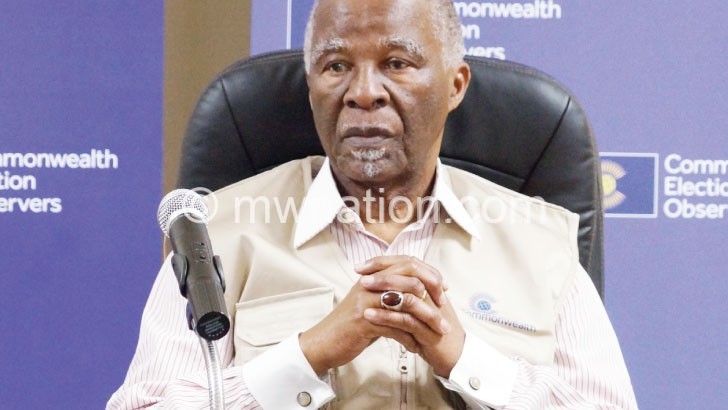Observers’ shameful role
All five High Court judges sitting as the constitutional court in Lilongwe ordered that fresh elections be held within 150 days.
This has finally drawn a line in the sand as a growing number of southern African leaders have come to power in dodgy elections.
Justice Healey Potani, who delivered the judgement, said: “We hold that the first respondent [Peter Mutharika] was not duly elected as president of Malawi. As a result, we hereby order nullification of the elections. We further order that a fresh election be held in accordance with the law and pursuant to directions we will make.”
Opposition candidates Saulos Chilima and Lazarus Chakwera, who brought the case amidst widespread claims of abuse, were finally vindicated.

In an interview shortly after the ruling, Chakwera said: ‘We saw justice. Malawi is again a democracy.”
And Chilima said: “I hope we have sent a nice message on the continent. The fact that we have national constitutions and electoral laws must count for something in the conduct of general elections.
“Those that are delegated or appointed to discharge the task of overseeing elections derive that authority from the people.”
The ruling has underlined the strength and independence of Malawi’s court system.
All eyes are now turning to the hordes of election observers who pronounced the election free and fair, bar a few mild criticisms.
Chilima does not mince his words: “For international observers, if what they are going to continue to do is election tourism, we should scrap it.
“It is no better than a cartel protecting each other. But if we want to continue with them, let’s redefine their role. It should not be a tick-the-box exercise.”
Chakwera is equally critical.
He says: “We have always had mixed feelings about what observer missions do. They scratch the surface and yet they think they know what they are doing.
“Almost like an exercise in futility and all they want to do is maintain the status quo and find excuses for things that are going wrong and are actually pushing the country deeper in the mire.
“This thing could have been arrested a long time ago. If it had not been for the court, we would have continued without change and these missions would keep recommending the same things over and over again.”
So numerous and detailed are the court’s findings of irregularities in the counting of votes, reconciliation of ballots and the Malawi Electoral Commission (MEC) failure to adhere to electoral rules, that it boggles the mind that these problems were not picked up and amplified by the election observers.
In a masterpiece of understatement, the court observed that the widespread use of correction fluid on the return ballots was a strong indication that the results were flawed. As were the use of duplicate sheets and the general administrative failure to properly manage the reconciliation of votes.
The European Union (EU) Election Observation Mission had 83 observers reporting from 342 polling stations in 27 of the 28 districts of Malawi.
Their finding makes for astonishing reading. The statement was released under the headline: “Well-managed, inclusive, transparent and competitive elections, but the campaign was marked by tensions and an unlevel playing field.”
The EU went on to state: “The process was largely well organised by MEC and voting on election day was well-managed.”
Perhaps most astonishing of all were the comments of EU chief observer Miroslav Poche: “Of particular note was the improved integrity of the voter register, a revised and public election calendar and the creation of constituency tally centres.”
Poche refers somewhat dismissively to the counting process, saying: “The tallying of results continues and it is clear that problems with results sheets are causing challenges.”
Equally out of touch was the Commonwealth Observer Group led by the former president of South Africa, Thabo Mbeki.
The group of “12 eminent persons” from across the Commonwealth heaped praise on the election, saying it had been handled with “professionalism and dedication”.
Both the EU and Commonwealth pronouncements were made before tallying had been completed.
Once statements with the adjectives “well-managed, inclusive, transparent and competitive” and “professionalism and dedication” had been issued, the world took its eyes off Malawi, satisfied that bar one or two “inconsistencies”, the election was credible and thus legitimate.
The problem is that observer missions with personnel who have other commitments and limited budgets, leave the scene after voting and criticism by the opposition of dodgy counting is dismissed as the groans of sore losers.
It takes a court ruling such as that of Malawi’s constitutional judges to demonstrate how shallow and toothless the election observers were.
They played their role in conferring legitimacy and then left Malawians to deal with the mess.—Daily Maverick





